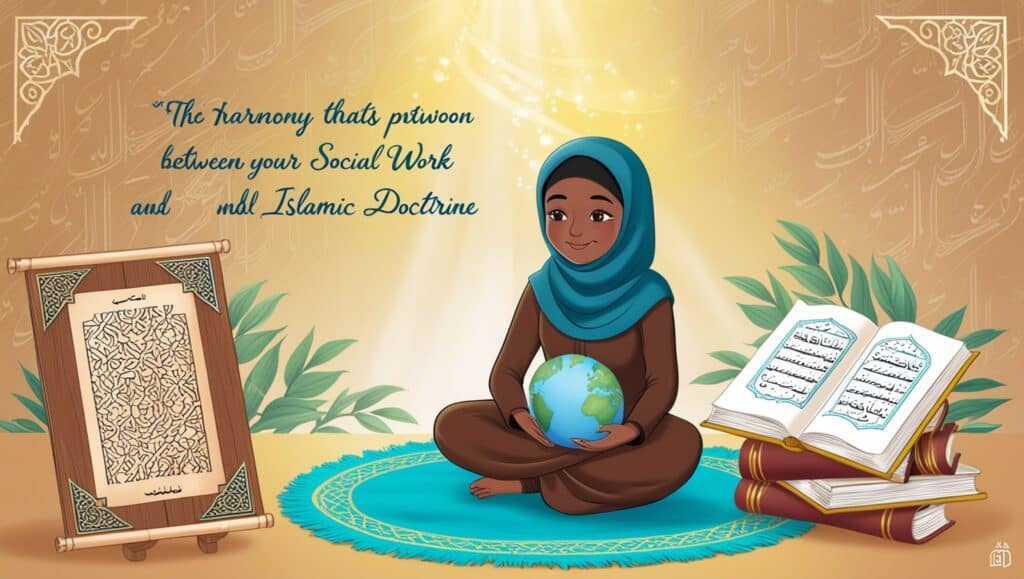Islam
Islam is experiencing significant growth as a religion globally. It is important to recognize that one in five individuals globally identifies as Muslim. Unfortunately, Islam is often surrounded by misconceptions and misunderstandings. Muslims reside in various regions across the globe, from China to Argentina and Russia to South Africa. Pakistan has the largest Muslim population in the world.
Islam represents a commitment to actively submit to the one God. This religion emphasizes the importance of worshiping a single, supreme Lord, who is recognized as the Originator and Creator of the universe. True peace, which is the essence of the term Islam, is achieved by fully adhering to the divine commandments, as God embodies the ultimate source of peace. Individuals who follow Islam hold a belief in one God and recognize Muhammad (PBUH) as the last Prophet sent by God. They dedicate their lives to serving God, the Creator and Sustainer of all that exists.
Social Work and Islam
Patel and colleagues (1998, p. 199) highlight five fundamental values within Islam:
- Prioritizing the welfare and support of the community.
- Every individual, regardless of gender, is valued equally.
- There is a connection between individual freedom and the community’s responsibilities towards each individual.
- The individual’s sense of responsibility and obligation is shaped by their conscience and the need for conformity.
- Engaging in dialogue to foster relationships between individuals.
Social Work Values and Islam
NASW presented six core values of social work, which are looked into in the Islamic context here;
Service
The primary and perhaps most fundamental value of social work is “service.” Service fundamentally involves the commitment to support individuals who require assistance and to address societal challenges in the most effective manner. This does not take into account any personal motivation. Islam places great emphasis on understanding and addressing human needs, particularly the importance of social support.
Self-sacrifice is a recurring theme in Islamic texts, highlighting a fundamental principle that Islam promotes in interpersonal relationships. Islam emphasizes that the path to progress involves self-sacrifice, highlighting that this act brings benefits to everyone. Islam emphasizes the importance of dedicating one’s efforts and energy to serve the society and community to which they belong (Chaney & Church, 2017).
From an Islamic perspective, service is viewed as an act of charity and philanthropy, both of which hold significant importance in Islamic practice. As previously mentioned, the fundamental aspect of this field originates from acts of kindness, where early advocates offered support and resources to individuals facing the heavy burdens of poverty, conflict, and natural disasters.
This principle is reflected in Islam, where the work of charitable individuals and the collective commitment to easing the hardships faced by the poor, orphans, and those in need are greatly valued (Pring, 2016). Islam encompasses a holistic approach to living, extending beyond mere religious rituals to influence all aspects of life.
The essence of this is that the holistic nature of Islam encompasses not just charitable contributions but also offers solutions to real-world issues, difficulties, and challenges. For instance, it emphasizes the importance of reconciliation, respect for elders, honoring one’s spouse, and being truthful in words and actions, and encourages the avoidance of exploitation while promoting collective well-being over individual interests.
Additionally, Islam offers various protective measures aimed at preventing issues and calamities, such as prohibitions against begging, environmental harm, water wastage, and land depletion, and it emphasizes cleanliness, goodwill towards others, strong family ties, and a genuine desire for the well-being of others.
Social Justice
Social justice positions individuals in the role of advocates for change, standing up against injustice, oppression, and exploitation. They are deeply attentive to the challenges brought about by poverty, discrimination, unemployment, abuse, and various other forms of inequality.
From an Islamic perspective, justice reflects moral integrity grounded in ethics, natural and societal laws, religious principles, and rational thought, emphasizing equity and fairness. It involves providing fair and transparent support to every individual in the community. Ultimately, the goal is to foster a society where every individual is respected and valued, ensuring fairness for all members.
Islam truly emphasizes the importance of justice for everyone, irrespective of their social status. It advocates for social justice that encompasses men, women, and children, extending its principles even to non-Muslims and those outside of one’s family. This includes a particular focus on caring for neighbors, orphaned children, and those in need.
Islam encompasses a range of interpretations regarding the concept of social justice. The following items are listed:
- Ensuring that each person receives what is rightfully theirs as part of the community is essential.
- It is important to meet basic human needs, including access to food, clean water, and secure housing, while respecting their dignity and self-worth.
- Additionally, it is crucial to distribute the benefits generated by society equitably among individuals.
- Promoting equal opportunities and ensuring that all essential services, including health and education, are accessible to everyone.
Zakat, recognized as the fourth pillar of Islam, serves as a profound example of social justice in action. Zakat involves the annual contribution of a portion of one’s wealth to support the well-being of individuals in need and the broader Muslim community. This is regarded as a vital responsibility for Muslims, directly aiding those who are in need.
Security, peace, and justice are interconnected elements that support and enhance one another, where the presence of one can lead to the realization of the others. By addressing oppression, unfairness, and inequality, we can foster justice, and as justice flourishes, consequently, peace and safety develop. The fundamental principles illustrate the alignment and harmony between Islam as a faith and social work as a profession.
Dignity and Worth of the Person
In the practice of social work, it is essential to respect and honor the inherent dignity and value of every individual, irrespective of their social standing. It is essential for social workers to approach their clients with empathy and respect, honoring the rich variety of cultural, religious, and ethnic backgrounds. Many Islamic principles highlight the importance of dignity and the inherent worth of each individual, including:
- Islam emphasizes the importance of human dignity and actively works to combat socio-economic injustice. It places a high value on human life, health, and overall well-being.
- Islam emphasizes the importance of caring for and protecting the elderly, the disabled, the orphaned, and the sick, viewing this responsibility as a fundamental obligation.
- Islam emphasizes the profound value of human life, highlighting that saving a single individual is similar to preserving the entire human race.
- Islam emphasizes that attaining good health is essential for comprehensive human development.
- Islam emphasizes the significance of education and the continuous growth of human knowledge as essential for the development of society as a whole.
- Islam recognizes the spiritual realm as essential for human growth, emphasizing the importance of nurturing our relationship with the Creator and fostering positive relationships with others.
- It highlights the necessity of fulfilling specific social responsibilities.
- Islam highlights the importance of meeting social and ethical obligations to foster a harmonious and comprehensive growth of the human spirit.
- Islam emphasizes the importance of creating a society where everyone has equal opportunities to grow and achieve their potential, ultimately contributing to the greater good of the community.
Importance of Human Relationships
It is essential for social workers to recognize the vital role that social relationships play. It is essential to acknowledge that enhancing quality of life is achieved through social change. Individuals prosper in relationships with others, as it is essential for their survival, growth, and the realization of their full potential. The significance of each person is deeply rooted in the broader community context in which they exist.
It is essential that society respects and upholds the dignity of each individual. It is important for each person to honor the principles of social doctrine to safeguard the rights and well-being of every member of the community. Islamic teachings encourage individuals to exhibit honesty, moral integrity, humility, kindness, and an open-minded approach. It is essential to address corruption and harmful actions with a focus on righteousness, forgiveness, and the management of emotions like anger and greed.
Working together to reach a greater shared purpose, like supporting those who are vulnerable, is strongly promoted in Islam. Religion emphasizes the importance of collaboration among individuals as a way to promote the collective growth of communities. This development offers the potential for a life that is both comfortable and meaningful. Islam defines mercy as the practice of treating others with kindness and virtue.
This fosters beauty, enhances community bonds, and improves the overall quality of life for everyone on our planet. Rahmah refers to a concept that embodies kindness and mercy. Mercy encompasses a range of meanings, such as expressions of love and care, as well as tolerance and acceptance. Rahmah is truly reflected in the ways we show devotion, affection, and generosity to those around us.
Integrity
This value requires professionals to act with integrity and reliability. Integrity and ethical conduct are essential components of a respectful Islamic personality. It is essential for social workers in this field to maintain honesty and fairness in their interactions with the community. It is important for them to arrive on time for their sessions as a sign of respect for their client.
Respecting confidentiality, upholding contracts and agreements, setting boundaries, and honoring established commitments are essential components of integrity. Integrity is an essential aspect of the social, legal, and moral responsibilities that every individual holds within a community. From the Islamic perspective, integrity serves as the essential framework that underpins human ethics.
The core principles of integrity include virtues such as compassion, respect, reliability, trustworthiness, wisdom, kindness, loyalty, and impartiality. It is essential for individuals to embody these virtues within themselves and to express them in their everyday interactions. Islam emphasizes the importance of integrity as a continuous dedication to both what we say and what we do.
Islam emphasizes the importance of integrity in all aspects, including both speech and actions. Spiritual beliefs encourage individuals to avoid behaviors such as indecency, envy, and malice. From a standpoint of integrity, it is important to recognize that Islam prohibits lying and false testimony. Islamic integrity involves cleansing the heart of any personal shortcomings.
These issues involve the hatred and devaluation of others, particularly those who are vulnerable, such as children, unfamiliar individuals, those lacking education, and individuals who are marginalized or economically disadvantaged. All these valuable aspects of integrity are supported by the field of social work.
However, despite this diversity within the religion, integrity in Islam aligns with the responsibilities assigned to those in helping professions. The Code of Ethics emphasizes the importance of honesty and transparency not only in professional settings but also in personal lives, a principle that aligns with Islamic teachings.
Competence
As professionals in their area, social workers are expected to play a role in broadening the understanding of social work practices. Competence refers to the capacity to fulfill specific roles and accomplish particular tasks associated with a designated position. Competence encompasses the ability to bring together diverse knowledge, specialized skills, and an understanding of various attitudes, techniques, methods, and theories.
This understanding is shaped by practical experience, personal values, and the capacity to develop knowledge and skills over time. The teachings of Islam hold significance in many areas of life. Honesty holds a significant place in Islam, and it is essential to ensure that responsibilities are assigned to those who possess the necessary skills and qualifications to effectively carry out the tasks at hand.
Reliability, connected with the insights gained from experience, is essential for demonstrating true competence. There is a strong focus on community responsibility, commitment, and guiding others. Nonetheless, as recognized in Islam, this concept aligns with the principles of social work.
Conclusion
In summary of the discussion, a key connection between Islam and the field of social work is the emphasis on charity. Therefore, considering the shared values between Islam and the principles of social work, it appears there is no valid reason to alter this merit, as it aligns well with the core teachings of Islam. However, the pursuit of justice for all is an essential element of both Islam and the field of helping others. While the profound spiritual significance of social justice in Islam is noteworthy, it remains an essential principle in the field of social work.
There is a harmonious understanding between the two parties. The teachings within Islam emphasize the importance of inherent self-worth and human dignity, encompassing a range of principles and interpretations. These include the dignity of individuals, communities, and society as a whole, as well as the respect for the environment. This perspective suggests that there is harmony between Islamic social doctrine and the values upheld in social work. In summary, the values associated with social work are deeply respected within Islam, and there is harmony between the fundamental principles of social work and Islamic teachings.
References
Albrithen, A. (2023). The Islamic Basis of Social Work in the Modern World. International Journal of Social Work Values and Ethics, 20(1), 171-193. https://doi.org/10.55521/10-020-113
Chaney, C. & Church, W. T. (2017). Islam in the 21st century: Can the Islamic belief system and the ethics of social work be reconciled? Journal of Religion & Spirituality in Social Work: Social Thought, 36(1-2), 25–47.
Patel, N.,Humphries, B. and Naik, D. (1998). The 3Rs in Social Work, Religion, Race and Racism in Europe (pp. 182-208), in C. Williams; H. Soydan and M. R. D. Johnson (eds), Social Work and Minorities: European Perspectives. London: Routledge.
Pring, R. (2016). Education, leadership and Islam: Theories discourses and practices from an Islamic perspective. By Saeeda Shah. British Journal of Educational Studies, 64(2), 269–271.






